一般现在时和特殊疑问句讲解及练习
- 格式:pdf
- 大小:125.23 KB
- 文档页数:7
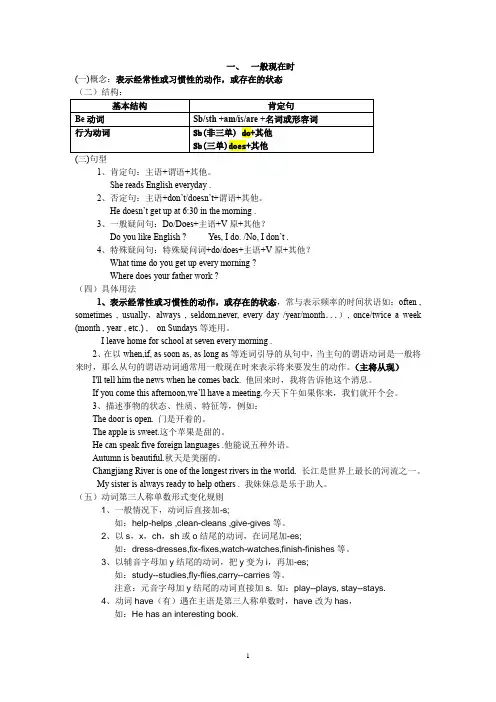
一、一般现在时(一)概念:表示经常性或习惯性的动作,或存在的状态1、肯定句:主语+谓语+其他。
She reads English everyday .2、否定句:主语+don’t/doesn’t+谓语+其他。
He doesn’t get up at 6:30 in the morning .3、一般疑问句:Do/Does+主语+V原+其他?Do you like English ? Yes, I do. /No, I don’t .4、特殊疑问句:特殊疑问词+do/does+主语+V原+其他?What time do you get up every morning ?Where does your father work ?(四)具体用法1、表示经常性或习惯性的动作,或存在的状态,常与表示频率的时间状语如:often , sometimes , usually,always , seldom,never, every day /year/month...), once/twice a week (month , year , etc.) , on Sundays等连用。
I leave home for school at seven every morning .2、在以when,if, as soon as, as long as等连词引导的从句中,当主句的谓语动词是一般将来时,那么从句的谓语动词通常用一般现在时来表示将来要发生的动作。
(主将从现)I'll tell him the news when he comes back. 他回来时,我将告诉他这个消息。
If you come this afternoon,we’ll have a meeting.今天下午如果你来,我们就开个会。
3、描述事物的状态、性质、特征等,例如:The door is open. 门是开着的。
The apple is sweet.这个苹果是甜的。
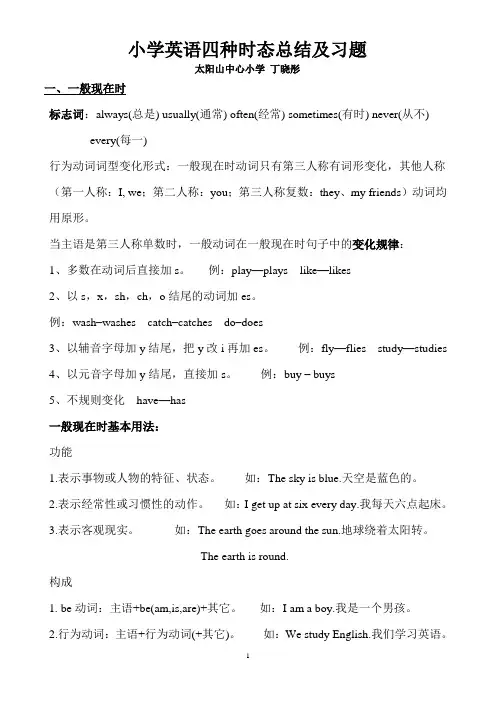
小学英语四种时态总结及习题太阳山中心小学丁晓彤一、一般现在时标志词:always(总是) usually(通常) often(经常) sometimes(有时) never(从不) every(每一)行为动词词型变化形式:一般现在时动词只有第三人称有词形变化,其他人称(第一人称:I, we;第二人称:you;第三人称复数:they、my friends)动词均用原形。
当主语是第三人称单数时,一般动词在一般现在时句子中的变化规律:1、多数在动词后直接加s。
例:play—plays like—likes2、以s,x,sh,ch,o结尾的动词加es。
例:wash–washes catch–catches do–does3、以辅音字母加y结尾,把y改i再加es。
例:fly—flies study—studies4、以元音字母加y结尾,直接加s。
例:buy – buys5、不规则变化have—has一般现在时基本用法:功能1.表示事物或人物的特征、状态。
如:The sky is blue.天空是蓝色的。
2.表示经常性或习惯性的动作。
如:I get up at six every day.我每天六点起床。
3.表示客观现实。
如:The earth goes around the sun.地球绕着太阳转。
The earth is round.构成1. be动词:主语+be(am,is,are)+其它。
如:I am a boy.我是一个男孩。
2.行为动词:主语+行为动词(+其它)。
如:We study English.我们学习英语。
句型肯定句:A. be动词:主语+ be + 其它成分如:He is a worker.B.行为动词:主语+动词(注意人称变化) +其它成分如:We like the little cat.否定句:A. be动词:主语+ be + not +其它成分如:They are not students.B.行为动词:主语+助动词(do/does) + not +动词原形+其它成分如:We don’t like the little cat.一般疑问句:A. be动词:Am / Is /Are +主语+ 其它成分如:Are you a teacher? Yes, I am. / No, I am not.Are they students of your school?Yes they are / No they aren’t.B.行为动词:助动词(Do/Does)+主语+动词原形+ 其它成分如:Do you like it? Yes, I do. / No. I don’t .Does he(she) like it? Yes, he( she )does. / No, he ( s he )doesn’t.特殊疑问句:疑问词+ 一般疑问句A. be动词:How many students are there in your school?B.行为动词:What do you usually do on Sunday?一般现在时动词be和have的变化形式1.动词Be 用法:第一人称单数用am,第三人称单数用is,其它人称用are。
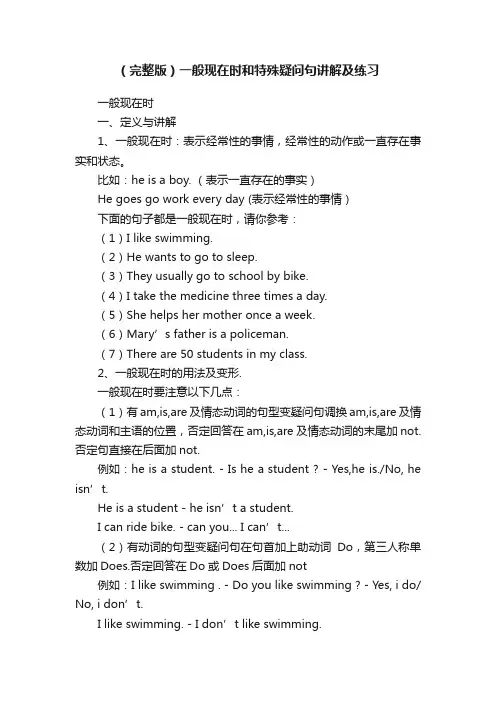
(完整版)一般现在时和特殊疑问句讲解及练习一般现在时一、定义与讲解1、一般现在时:表示经常性的事情,经常性的动作或一直存在事实和状态。
比如:he is a boy. (表示一直存在的事实)He goes go work every day (表示经常性的事情)下面的句子都是一般现在时,请你参考:(1)I like swimming.(2)He wants to go to sleep.(3)They usually go to school by bike.(4)I take the medicine three times a day.(5)She helps her mother once a week.(6)Mary’s father is a policeman.(7)There are 50 students in my class.2、一般现在时的用法及变形.一般现在时要注意以下几点:(1)有am,is,are及情态动词的句型变疑问句调换am,is,are及情态动词和主语的位置,否定回答在am,is,are及情态动词的末尾加not.否定句直接在后面加not.例如:he is a student. - Is he a student ? - Yes,he is./No, he isn’t.He is a student - he isn’t a student.I can ride bike. - can you... I can’t...(2)有动词的句型变疑问句在句首加上助动词Do,第三人称单数加Does.否定回答在Do或Does后面加not例如:I like swimming . - Do you like swimming ? - Yes, i do/ No, i don’t.I like swimming. - I don’t like swimming.(3)第三人称单数在动词的末尾要加s或es,以s,ch,sh结尾的单词加es,特殊单词特殊记.例如:He goes to school at 7:00 every day.要特别注意在什么情况要使用一般现在时.现在请你完成一些练习,让你更熟练地掌握一般现在时:(一).用动词的适当形式填空1. She _________(go) to school at seven o’clock.3. He usually ___________ up at 17:00.(get )4. She ___________ (live) in Beijing.7. My father __________ (watch) TV every evening .9.________ Amy _________ (read) English every day10. Chen Jie sometimes _________(go)to the park with her sister.(二).选择填空1.I want____homework now.A. doingB. to doC. to do myD. do my2.It's time______.A. go to schoolB. play gamesC. to go homeD. to do my homeworks3.______go and help her.A. Let's meB. Let's usC. Let'sD. Let's to4.Do they have a new car? Yes,_____.A .they are B.they have C. they don't D. they do5.He often _________ supper at 6:00 in the evening.A. haveB. has c. is having D. is eating6. We _____________ any Chinese classes on Friday.A. are havingB. aren’t havingC. don’t haveD. are have(三)、用括号内动词的适当形式填空。

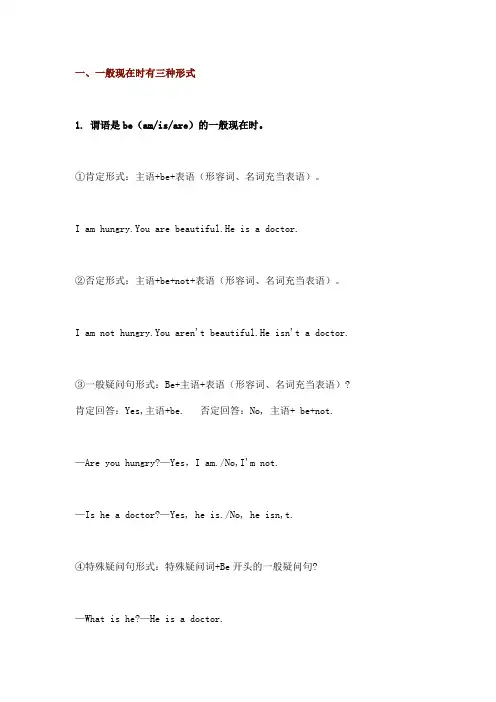
一、一般现在时有三种形式1. 谓语是be(am/is/are)的一般现在时。
①肯定形式:主语+be+表语(形容词、名词充当表语)。
I am hungry.You are beautiful.He is a doctor.②否定形式:主语+be+not+表语(形容词、名词充当表语)。
I am not hungry.You aren't beautiful.He isn't a doctor.③一般疑问句形式:Be+主语+表语(形容词、名词充当表语)? 肯定回答:Yes,主语+be. 否定回答:No, 主语+ be+not.—Are you hungry?—Yes,I am./No,I'm not.—Is he a doctor?—Yes, he is./No, he isn,t.④特殊疑问句形式:特殊疑问词+Be开头的一般疑问句?—What is he?—He is a doctor.注意:be要随着主语变。
2. 谓语动词是实义动词(及物动词或不及物动词)的一般现在时。
①肯定形式:“主语+及物动词+宾语”或“主语+不及物动词”。
She has a little brother.她有一个弟弟。
The sun rises in the east.太阳从东方升起。
②否定形式:“主语+don't/doesn't+及物动词+宾语”或“主语+don't/doesn't+不及物动词”。
She doesn't have a little brother.她没有弟弟。
I don't eat every morning.我每天早晨都不吃饭。
③一般疑问句形式:“Do/Does+主语+及物动词原形+宾语”或“Do/Does+主语+不及物动词原形”。
肯定回答:Yes,主语+do/does. 否定回答是:No, 主语+ don't/doesn't.—Do you eat every morning?—Yes, I do./No, I don't.—Does she have a little brother?—Yes, she does./No, she doesn't.④特殊疑问句:特殊疑问词+do/does开头的一般疑问句?What do you like?When do you go to school?注意:根据主语确定用do还是does。

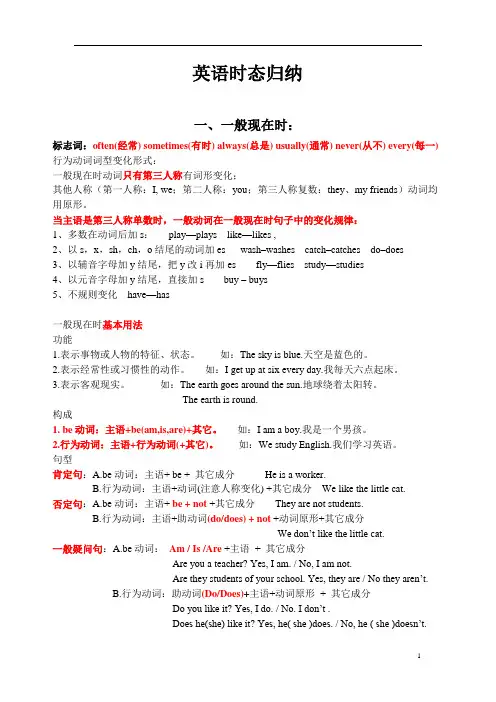
英语时态归纳一、一般现在时:标志词:often(经常) sometimes(有时) always(总是) usually(通常) never(从不) every(每一)行为动词词型变化形式:一般现在时动词只有第三人称有词形变化;其他人称(第一人称:I, we;第二人称:you;第三人称复数:they、my friends)动词均用原形。
当主语是第三人称单数时,一般动词在一般现在时句子中的变化规律:1、多数在动词后加s:play—plays like—likes ,2、以s,x,sh,ch,o结尾的动词加es wash–washes catch–catches do–does3、以辅音字母加y结尾,把y改i再加es fly—flies study—studies4、以元音字母加y结尾,直接加s buy – buys5、不规则变化have—has一般现在时基本用法功能1.表示事物或人物的特征、状态。
如:The sky is blue.天空是蓝色的。
2.表示经常性或习惯性的动作。
如:I get up at six every day.我每天六点起床。
3.表示客观现实。
如:The earth goes around the sun.地球绕着太阳转。
The earth is round.构成1. be动词:主语+be(am,is,are)+其它。
如:I am a boy.我是一个男孩。
2.行为动词:主语+行为动词(+其它)。
如:We study English.我们学习英语。
句型肯定句:A.be动词:主语+ be + 其它成分He is a worker.B.行为动词:主语+动词(注意人称变化) +其它成分We like the little cat.否定句:A.be动词:主语+ be + not+其它成分They are not students.B.行为动词:主语+助动词(do/does) + not+动词原形+其它成分We don’t like the little cat.一般疑问句:A.be动词:Am / Is /Are +主语+ 其它成分Are you a teacher? Yes, I am. / No, I am not.Are they students of your school. Yes, they are / No they aren’t.B.行为动词:助动词(Do/Does)+主语+动词原形+ 其它成分Do you like it? Yes, I do. / No. I don’t .Does he(she) like it? Yes, he( she )does. / No, he ( she )doesn’t.特殊疑问句:疑问词+ 一般疑问句A.be动词:How many students are there in your school?B.行为动词:What do you usually do on Sunday?一般现在时动词be和have的变化形式1.动词Be 叫连系动词, 用法:第一人称单数用am,第三人称单数用is,其它人称用are。
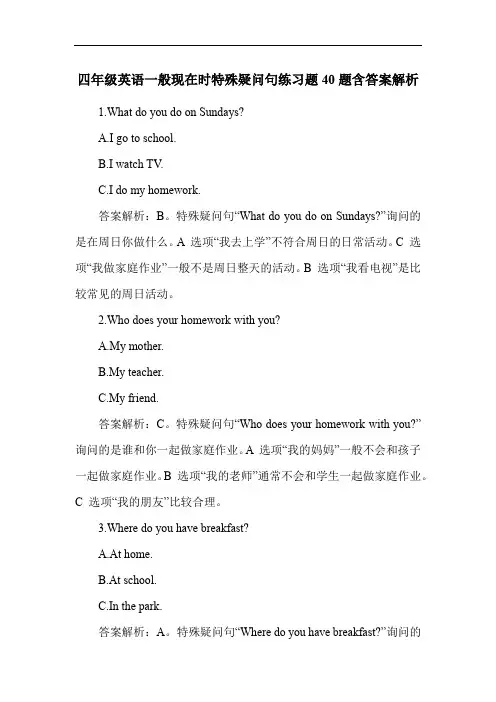
四年级英语一般现在时特殊疑问句练习题40题含答案解析1.What do you do on Sundays?A.I go to school.B.I watch TV.C.I do my homework.答案解析:B。
特殊疑问句“What do you do on Sundays?”询问的是在周日你做什么。
A 选项“我去上学”不符合周日的日常活动。
C 选项“我做家庭作业”一般不是周日整天的活动。
B 选项“我看电视”是比较常见的周日活动。
2.Who does your homework with you?A.My mother.B.My teacher.C.My friend.答案解析:C。
特殊疑问句“Who does your homework with you?”询问的是谁和你一起做家庭作业。
A 选项“我的妈妈”一般不会和孩子一起做家庭作业。
B 选项“我的老师”通常不会和学生一起做家庭作业。
C 选项“我的朋友”比较合理。
3.Where do you have breakfast?A.At home.B.At school.C.In the park.答案解析:A。
特殊疑问句“Where do you have breakfast?”询问的是你在哪里吃早餐。
B 选项“在学校”一般不在学校吃早餐。
C 选项“在公园”也不是吃早餐的常见地点。
A 选项“在家”是比较合理的。
4.When do you get up in the morning?A.At 6:00.B.At 7:00.C.At 8:00.答案解析:B。
特殊疑问句“When do you get up in the morning?”询问的是早上你什么时候起床。
根据一般小学生的起床时间,7 点比较合理。
A 选项6 点有点早,C 选项8 点可能上学就迟到了。
5.How do you go to school?A.By bus.B.By bike.C.On foot.答案解析:A。
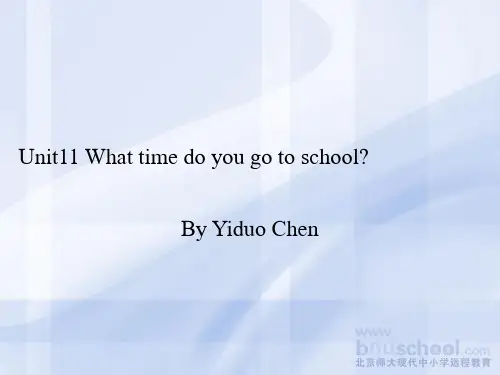
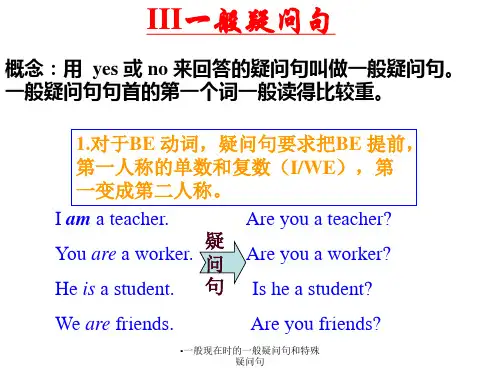
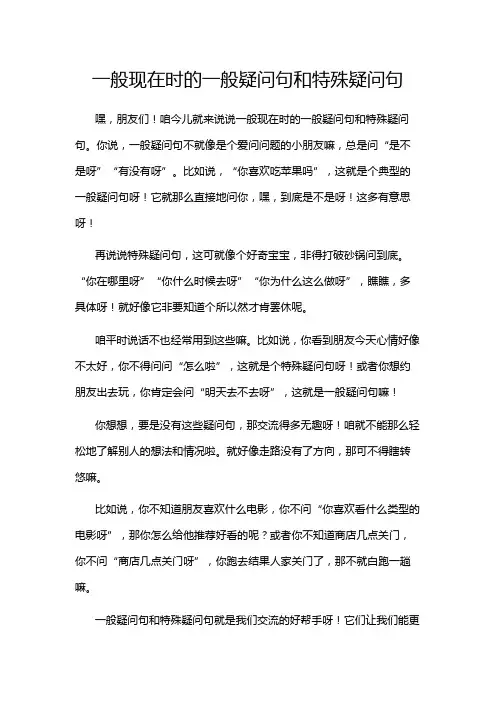
一般现在时的一般疑问句和特殊疑问句嘿,朋友们!咱今儿就来说说一般现在时的一般疑问句和特殊疑问句。
你说,一般疑问句不就像是个爱问问题的小朋友嘛,总是问“是不是呀”“有没有呀”。
比如说,“你喜欢吃苹果吗”,这就是个典型的一般疑问句呀!它就那么直接地问你,嘿,到底是不是呀!这多有意思呀!再说说特殊疑问句,这可就像个好奇宝宝,非得打破砂锅问到底。
“你在哪里呀”“你什么时候去呀”“你为什么这么做呀”,瞧瞧,多具体呀!就好像它非要知道个所以然才肯罢休呢。
咱平时说话不也经常用到这些嘛。
比如说,你看到朋友今天心情好像不太好,你不得问问“怎么啦”,这就是个特殊疑问句呀!或者你想约朋友出去玩,你肯定会问“明天去不去呀”,这就是一般疑问句嘛!你想想,要是没有这些疑问句,那交流得多无趣呀!咱就不能那么轻松地了解别人的想法和情况啦。
就好像走路没有了方向,那可不得瞎转悠嘛。
比如说,你不知道朋友喜欢什么电影,你不问“你喜欢看什么类型的电影呀”,那你怎么给他推荐好看的呢?或者你不知道商店几点关门,你不问“商店几点关门呀”,你跑去结果人家关门了,那不就白跑一趟嘛。
一般疑问句和特殊疑问句就是我们交流的好帮手呀!它们让我们能更深入地了解彼此,让我们的对话更加丰富多彩。
它们就像是调味料,给我们的交流增添了各种味道。
你再想想,要是你和别人聊天,一直陈述句陈述句的,那多无聊呀!偶尔来个疑问句,气氛一下子就活跃起来啦。
所以呀,咱可得好好掌握一般现在时的一般疑问句和特殊疑问句,让我们的交流更加顺畅、有趣。
别小看这些小小的问句,它们可有着大作用呢!它们能让我们更好地理解别人,也能让别人更好地理解我们。
那我们的生活不就更加有意思啦!咱可不能小瞧了它们,得好好利用起来呀!。
一般现在时1概念引入在英语中,不同时间发生的动作和情况,要用不同的动词形式表示,这种不同的动词形式叫做动词的时态。
今天我们要学习的是一般现在时。
2用法讲解一、一般现在时的使用范围。
1. 表示现在的状态。
例如:I’m twelve. 我十二岁。
Where’s the schoolbag? 书包在哪里?2. 表示经常或者习惯性的动作。
例如:I have lunch every day. 我每天吃午饭。
Gina always asks: “Where is my schoolbag?”Gina总是问:“我的书包在哪里啊?”3. 表示客观事实或者存在。
例如: My sister is a teacher. 我姐姐是一位老师。
The earth turns around the sun. 地球绕着太阳转。
4. 表示主语所具备的性格和能力。
例如:She likes English very much. 她很喜欢英语。
Bill likes beef, but he doesn’t like chicken.比尔喜欢牛肉但是不喜欢鸡肉。
以上所述均是一般现在时的基本使用范围,除此之外一般现在时还有其他一些特殊用法,比如:一般现在时可以用在一些从句中表将来等,我们会在以后的学习中讲到。
注意:一般现在时态经常与often(经常),sometimes(有时),always(总是),usually (通常)等副词连用,也经常与every day(每天), every week(每周), every month (每月), every term(每学期), every year(每年), once a week(一周一次),twice a year(一年两次)等时间状语连用。
例如:She gets up early every morning. 她每天早上早起。
I go to see my grandmother every month. 我每个月都去看我的奶奶。
(完整版)初一英语各种时态复习及练习题[初一资料] 初一英语各种时态复习及练习题一、一般现在时1. 定义:表示通常性、规律性、习惯性的状态或者动作(有时间规律发生的事件)的一种时间状态,或.表示主语具备的性格、能力和特征。
2. 句型:主语+动词原形+其他注:当主语是第三人称单数时:肯定句主语+动词的第三人称单数+其他。
特别提一点:不可数名词也算作单数处理。
3.常与表示频率的时间状语连用。
如always, usually,often, sometimes,every morning/night/evening/day/week/year等。
4.例句:(1)My mother gives ten Yuan to my sister every week.我妈妈每星期给我妹妹十元钱。
(2)We usually go to school at 7:30. 我们通常7:30上学去。
二、现在进行时1. 定义:表示动作发生的时间是“现在”,动作目前的状态是“正在进行中”。
2. 句型:现在进行时的构成是:主语+be+v.ing〔现在分词〕形式注:在现在时中,be 要根据人称代词和名词的单复数不同,而分别使用am/is/are,即:I am。
/he/she/it 包括单数名词和不可数名词用is。
you/we/they 包括复数名词用are。
注意:be 动词在现在时里算作“助动词”,翻译正在进行时的时候,be不能解释为“是”,否则不通顺。
它只是和现在分词一起构成“进行时”。
3. 常与表示现在的时间状语连用,如now, this week, at this moment 等;或者告诉你一个准确的现在时间,或者用look, listen提醒听者注意正在发生的事。
4. 例句:(1)They are playing basketball now.现在他们正在打篮球。
(2)Listen! She is singing a song.听,她正在唱歌。
一般现在时一、定义一般现在时是指当前进行的动作或存在的状态。
它用于描述日常活动、习惯、常规事物等。
主要有以下四种用法:1.表示经常性或习惯性的动作。
1)I exercise every day.我每天锻炼身体。
2)She usually watches TV at night.她通常晚上看电视。
3)We often go on trips.我们经常去旅行。
4)He goes to the library every Monday.他每周一去图书馆。
5)I get up at7o'clock every morning.我每天早上七点起床。
6)He never eats meat.他从不吃肉。
7)I like drinking coffee.我喜欢喝咖啡。
8)He practices playing the guitar every day.他每天练习弹吉他。
9)She is always friendly.她总是很友善。
10)There is a library in our school.在我们学校里有一个图书馆。
2.表示主语具备的性格、能力、特征或状态。
1)She speaks four languages fluently.她能够流利地说四种语言。
2)Our team always works well under pressure.我们的团队总是能够在压力下表现出色。
3)The cat has a keen sense of hearing.这只猫具有敏锐的听力。
4)He knows how to play the piano beautifully.他懂得如何演奏美妙的钢琴。
5)Mary has a positive attitude towards challenges.玛丽对挑战持积极的态度。
6)He likes swimming.他喜欢游泳。
7)My grandmother always remembers everyone's birthdays.我奶奶总是记得每个人的生日。
小学英语一般现在时一. 意义:表示经常发生的事情,动作或存在的状态二. 构成及变化1.be动词的变化。
肯定句:主语+be(am,is,are)+其它。
如:I am a boy.我是一个男孩。
否定句:主语+ be + not +其它。
如:He is not a worker.他不是工人。
一般疑问句:Be +主语+其它。
如:-Are you a student? -Yes. I am. / No, I'm not.特殊疑问句:疑问词+一般疑问句。
如:Where is my bike?2. 行为动词的变化。
l、当主语为第一,二人称及复数时,助动词为do肯定句:主语+动词原形(+其它)。
如:We often play basketball after school.否定句:主语+ don't+动词原形(+其它)。
如:we don’t play basketball after school.一般疑问句:Do +主语+动词原形+其它?如: Do you often play basketball after school l? Yes, we do. / No, we don't.特殊疑问句:疑问词+以do开头的一般疑问句?如: What do you often do after school ?2、当主语为第三人称单数时 ,助动词为does肯定句:主语+动词三单式(+其它)。
如: He swims well.否定句:主语+ doesn’t+动词原形(+其它)。
如:He doesn’t swim well..一般疑问句:Does +主语+动词原形+其它。
如:Does he swim well ?Yes, he does. / No, he doesn't.特殊疑问句:疑问词+以does开头的一般疑问句?如: How does your father go to work?三.第三人称单数的动词变化规则(只有在第三人称为主语的肯定句中,动词才用三单式)(1)多数动词直接加s: runs gets likes collets takes plays climbs…….(2)结尾是s, x, sh, ch, o,前为辅音字母,结尾加es : watches teaches goes does washes crosses mixes brushes(3)动词末尾y前为辅音:将y改为i加es: study→studies fly→fliescarry→carriescry→cries但在y前如果为元音则直接加s: buys says四.时间标志:always , usually , often , sometimes ,every…一般现在时练习题(1)I.用下列单词的适当形式填空1.We often___________(play) in the playground.2.He _________(get) up at s ix o’clock.3.__________you _________(brush) your teeth every morning?4.What________________(do) he usually________________(do) after school?5.Danny ________________(study) English, Chinese, maths, science and Art at school.6.Mike sometimes __________(go) to the park with his sister.7.At eight at night, she __________(watch) TV with his parents.8.________ Mike________(read) English every day?9.How many lessons_________your classmates________(have) on Monday?10.What time_________his mother_________(do) the housework?II.改句子1.Do you often play football after school? (改为肯定句)2.I have many books.(改为否定句)3.Gao Shan’s sister likes playing table tennis (改为否定句)4.She lives in a small town near New York.(改为一般疑问句)5.I watch TV every day.(改为一般疑问句)6.We have four lessons.(改为否定句)7.Nancy doesn’t run fast (改为肯定句)8.My dog runs fast.否定句:一般疑问句:9.Mike has two letters for him.一般疑问句:否定句:10.I usually play football on Friday afternoon.否定句:一般疑问句:划线提问11.Su Yang usually washes some clothes on Saturday.否定句:一般疑问句:划线提问:12.Mingming usually waters the flowers every day.否定句:一般疑问句:13.Tom does his homework at home.否定句:一般疑问句:一般现在时练习题(2)一、用所给动词的真确形式填空1.I like ____________ (swim).2.He _________(read) English every day.3.We _________(go)to school at seven in the morning.4.Mike________(go)to school at seven in the morning.5.My mother________(like) ______(go) shopping.6.I can ________(draw) many beautiful pictures.7.She_________(make) a model plane.8.Do you ________(like)_________(run)?9.Does he_________(like)_________(jump) ?10.Does Nancy_________(grow)flowers on Saturday ?11.The teachers________(like)___________(dance).12.The teacher________(like)____________(dance).13.The students___________(speak) English in class.14.The student_________(speak) Chinese after class.15. Let’s____________and play football . ( go )16. He_____________ like swimming . ( not )17. I’m sorry ____________that . ( hear )18. Wang Bing is____________ ( write ) an E-mail to his friend .19. He has_____________a headache . ( get )20. _________you study English at school ? Yes , I___________. ( do )21. __________your sister study English at school ? No , she__________ . ( do )22. I’m _________ better . ( feel )23. Why__________Tom absent today ? ( be )二、用所给的人称改写句子1.I take photos on Sunday. ( Mike)2.We grow beautiful flowers. (she)3.They like collecting stamps. (Ben)4.I listen to music carefully. (my aunt)5.You like making a model ship. (Helen)6.We clean the classroom every day. (he)7.They look after the pandas. (Mr Wang)8.I draw a tree and some flowers. (Nancy)9.We go to bed at eight. ( my sister)10.I read newspapers in the evening. (Mr Green)一般现在时练习一、写出下列动词的第三人称单数talk______forget______hope______stop______perform______play______say______buy______worry______fly______study_______like_______make______take______love_______recite_______become_______come_______drive_______shine_______leave_____wake_______ride_______write_______hike______give______see______swim______stop______shop_______plan______get_______s it_______let_______cut_______run_______forget_______begin_______wash_____watch_______finish______teach_____fish_______reach_______go_______do_____二、用括号内动词的适当形式填空。
一般现在时基本用法介绍一、一般现在时的基本用法(一)表示经常性发生或反复习惯性发生的动作;经常用到表示频率的时间状语连用。
(时间状语:regularly,once a month. morning/night/evening/day/week/year ,often经常,usually通常,always总是,every每个,sometimes 有时,at…在几点钟)。
如:I usually get up at six.(表示经常性的事情。
)I get up at six everyday我每天六点起床。
He often has dinner at home.(经常性事情)They always go to school on foot.他们总是步行去上学。
(“总是”表示经常性的事情)(二)表示事物或人物(主语)的现在的特征、状态,这种情形下,通常不带时间状语。
如:The sky is blue.天空是蓝色的。
He works in a big company.他在一家大公司工作。
(三)表示客观现实、客观真理、科学事实、格言等;如: The earth goes around the sun.地球绕着太阳转。
There are four seasons in a year.The sun always rises in the east.Walls have ears. 隔墙有耳。
(四)表示将来。
如:1.表示按时间表拟定的或安排好的到了时间就会发生的事情或动作:The train arrives at 10:30,There is still plenty of time.火车10:30才会到达,还有足够多的时间。
She comes back next week.她下周就会回来的。
2.在时间状语从句中和条件状语从句中代替一般将来时I will give you some candy when we meet next week. If he arrives,please give me a phone call .二、一般现在时的构成1.be动词:主语+be(am is are)+其它。
英语一般现在时全面讲解附练习及答案概念1.表示经常性或习惯性的动作,常与表示频度的时间状语连用。
如:al ways, usually, often, sometimes, seldom(很少), never(决不), every day, at 8:30, on Sunday,in the morning等。
如:I always get up at 6:00 in the morning.2.表示现在时刻的状态、能力、性格、个性。
如:She loves English very much. My sister can play the piano very well.3.表示客观的事实。
如:The sun rises in the east. 太阳从东方升起。
4.格言或警句。
如:Pride goes before a fall. 骄者必败。
02句子结构1.如果句子主语的人称是I, we, you, they或复数名词时,动词用动词原形。
如:We often go home by bus.2.如果句子的主语是第三人称单数,即:he, she, it 或单数名词时,动词要用第三人称的单数形式。
如:He often goes home by bus03动词的第三人称单数构成规则1.一般情况下在动词的后面直接加“s”;如:work→works play→plays¬ rain→rains see→sees visit→visits2.以o, x,s,sh, ch结尾的动词,在后面加“es”;如:do→does fix→fixes guess→guesses wash→washes teach→teaches3.以辅音字母加y结尾的动词,先把“y”改为“i”, 再加“es”;如:fly→flies study→studies carry→carries4.不规则变化。
如:have→has04注意在一般现在时的句子中,如果前面使用了助动词does, doesn’t, will, won’t, can, can’t, would, wouldn’t, must, mustn’t 等,尽管主语是第三人称单数,后面的动词用动词原形。
一般现在时一、定义与讲解1、一般现在时:表示经常性的事情,经常性的动作或一直存在事实和状态。
比如:he is a boy. (表示一直存在的事实)He goes go work every day (表示经常性的事情)下面的句子都是一般现在时,请你参考:(1)I like swimming.(2)He wants to go to sleep.(3)They usually go to school by bike. (4)I take the medicine three times a day. (5)She helps her mother once a week. (6)Mary’s father is a policeman. (7)There are 50 students in my class.2、一般现在时的用法及变形.一般现在时要注意以下几点:(1)有am,is,are及情态动词的句型变疑问句调换am,is,are及情态动词和主语的位置,否定回答在am,is,are及情态动词的末尾加not.否定句直接在后面加not.例如:he is a student. - Is he a student ? - Yes,he is./No, he isn’t.He is a student - he isn’t a student.I can ride bike. - can you... I can’t...(2)有动词的句型变疑问句在句首加上助动词Do,第三人称单数加Does.否定回答在Do 或Does后面加not例如:I like swimming . - Do you like swimming ? - Yes, i do/ No, i don’t.I like swimming. - I don’t like swimming.(3)第三人称单数在动词的末尾要加s或es,以s,ch,sh结尾的单词加es,特殊单词特殊记.例如:He goes to school at 7:00 every day.要特别注意在什么情况要使用一般现在时.现在请你完成一些练习,让你更熟练地掌握一般现在时:(1).用动词的适当形式填空1. She _________(go) to school at seven o’clock.3. He usually ___________ up at 17:00.(get )4. She ___________ (live) in Beijing.7. My father __________ (watch) TV every evening .9.________ Amy _________ (read) English every day10. Chen Jie sometimes _________(go)to the park with her sister.(二).选择填空1.I want____homework now.A. doingB. to doC. to do myD. do my2.It's time______.A. go to schoolB. play gamesC. to go homeD. to do my homeworks 3.______go and help her.A. Let's meB. Let's usC. Let'sD. Let's to 4.Do they have a new car? Yes,_____. A .they are B.they have C. they don't D. they do 5.He often _________ supper at 6:00 in the evening.A. haveB. has c. is having D. is eating 6. We _____________ any Chinese classes on Friday.A. are havingB. aren’t havingC. don’t haveD. are have(三)、用括号内动词的适当形式填空。
1. He often _________ (have) dinner at home. 2. Daniel and Tommy _________ (be) in Class One. 3. We _________ (not watch) TV on Monday. 4. Nick_________ (not go) to the zoo on Sunday. 5. they _________ (like) the World Cup? 6. What they often_________ (do) on Saturdays? 7. your parents _________ (read) newspapers every day? 8. The girl _________ (teach) us English on Sundays. 9. She and I _________ (take) a walk together every evening. 10. There _________ (be) some water in the bottle. 11. Mike_________ (like) cooking. 12. They _________ (have) the same hobby. 13. My aunt _________ (look) after her baby carefully. 14. You always _________ (do) your homework well. 15. I _________ (be) ill. I’m staying in bed.(四)、按要求改写句子。
1. Do you often play football after school? (肯定回答) 2. I have many books. (改为否定句) 3. Gao Shan’s sister likes playing table tennis (改为否定句) 4. She lives in a small town near New York. (改为一般疑问句) 5. I watch TV every day. (改为一般疑问句) 6. David has got a goal. (改为一般疑问句) 7. We have four lessons.(否定句) 8. Nancy doesn’t run fast (肯定句) 9. My dog runs fast. 否定句:特殊疑问句练习(二)一.用what time, what color, what day, what填空。
1. A: ______ _______ is it? B: It is nine o’clock.2. A: ______ _______ does your mother get up?B: My mother gets up at 6:30.3. A: ______ _______ do you go to bed? B: I go to bed at 10:00.4. A: ______ _______ do Diana and Fiona have supper?B: Diana and Fiona have supper at 18:00.5. A: ______ _______is it? B: It is purple.6. A: ______ _______ is the sky? B: The sky is blue.7. A: ______ _______ is your coat? B: My coat is black.8. A: ______ _______ is the dog? B: The dog is white.9. A: ______ _______ is today? B: Today is Monday.10. A: ______ _______ is tomorrow? B: Tomorrow is Tuesday.二.连线:(Match)1. What’s on the chair? There is a book in the bag.2. How is your father? These are apples.3. What are these? I go to school by bus.4. What is in the bag? The radio is on the chair.5. How do you go to school? My father is fine.6. How much is it? I wash my face in the morning.7. What time is it? I have two hands.8. When do you wash your face? It is four o’clock.9. How many hands do you have? I It is 5 RMB(人民币).10.When do you have lunch? I have lunch at noon.今日的作业:1、请你分别写出10个一般现在时的句子,10个一般疑问句并做回答,10和特殊疑问句并作回答。
2、请将今日的错题全部订正,并且反复背诵。
下周我将会报中文让你口头翻译,必须完成。
3、将今天学的定义全部背诵,下周抽查。
4、认读七年级(上)1-6单元的单词,将单词先抄写在笔记本上(一遍),不能写中文,然后一个一个认读并且翻译给家长听,家长可听磁带检查孩子是否发音标准,一天一个单元,第一遍认读正确的单词表示能够记忆,将第一遍认读错误的单词标记出来再次认读,必须一次性全部正确,不然须将错误的单词全部重新认读,家长签字,望配合。